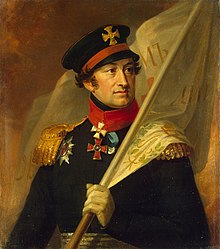
Back Alexander Alexandrowitsch Bibikow German Alexandre Alexandrovitch Bibikov French Бибиков, Александр Александрович Russian Aleksander Aleksandrovič Bibikov Slovenian
Aleksandr Aleksandrovich Bibikov | |
|---|---|
 Portrait of Bibikov by George Dawe | |
| Born | 18 January [O.S. 7 January] 1765 |
| Died | 1 August [O.S. 20 July] 1822 (aged 57) Dresden |
| Buried | |
| Allegiance | |
| Service/ | Imperial Russian Army |
| Years of service | 1774–1813 |
| Rank | General |
| Battles/wars | Russo-Swedish War |
| Awards |
|
| Spouse(s) | Anna Vasilyevna Khanykova |
| Relations | Aleksandr (father) |
Aleksandr Aleksandrovich Bibikov (Russian: Александр Александрович Бибиков) (18 January [O.S. 7 January] 1765 – 1 August [O.S. 20 July] 1822) was an officer of the Imperial Russian Army, who saw service during the Russo-Swedish War and the Napoleonic Wars. He was ambassador to several countries, and also served as a senator in the Governing Senate.
Born into a noble family as the son of an eminent general of Empress Elizabeth's service, Aleksandr Bibikov was enrolled into the lists of the Izmaylovsky Regiment at just three years old. After his father's death on campaign in 1774, the younger Bibikov was promoted to officer status at nine years old, and by the time he was old enough to join the ranks of his regiment, he already held the rank of captain. He served in the Empress Catherine's retinue for a time, before taking part in the Russo-Swedish War, and seeing action on a number of occasions. Wounded in battle, and presented several awards, he entered the civil service during the years of peace, and was given various state and diplomatic appointments by the Emperor Paul I. After a series of brief postings to the Portuguese court and the Electorate of Saxony, he was for a time unemployed during the early reign of Emperor Alexander I, though he eventually returned to serve in various diplomatic and civil service roles.
With Napoleon's invasion of Russia in 1812, Bibikov petitioned to serve in the army once more, and was appointed to command various militias, including those of St Petersburg and Novgorod. He and his forces distinguished themselves at the Second Battle of Polotsk, and at the Battle of Smoliani, where he was wounded in the leg. Unable to ride or walk, he fought the next two battles, at Borisov and Berezina, from a sleigh, and when his horses were killed at Berezina, he leant against one of his adjutants. His forces pursued the French on their retreat from Russia, though Bibikov was forced eventually to resign due to ill health. He returned to his political duties for a time in St Petersburg, and wrote an account of his father's life and campaigns. He died in 1822 while seeking treatment abroad, and was interred in the Alexander Nevsky Lavra.
© MMXXIII Rich X Search. We shall prevail. All rights reserved. Rich X Search